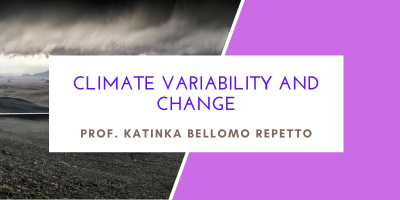Climate Variability and Change

Period: First semester
Course Unit Contents:
1. Global energy balance: Top of atmosphere radiative balance; Simple models of energy balance.
2. Atmospheric radiative transfer: Energy absorption, reflection, scattering and emission processes.
3. Surface energy balance: Heat and turbulent fluxes.
4. Natural climate variability: Teleconnections patterns; Coupled modes of climate variability and their driving mechanisms.
5. Historical climate: Climate observations since the second half of the nineteenth century.
6. Climate sensitivity and feedbacks: Response of the climate system to changes in forcing and the role of feedback mechanisms; Simple models of climate change.
7. Global climate models: Numerical models to simulate the climate system and project future climate changes; The Intergovernmental Panel on Climate Change (IPCC) and policy implications.
8.Natural climate change: Natural fluctuations in climate caused by internal processes and external forcings.
9. Anthropogenic climate change: Impacts of human activities on the global climate system.
Planned learning activities and teaching methods: The course will be delivered through a combination of lectures, guided discussions, group activities, project-based learning, practical exercises, and case study analysis. Active student participation will be encouraged through the use of innovative teaching methods aimed at fostering dynamic and engaging learning experiences. Curricular and support activities will make use of flexible teaching methods and tools, tailored to the specific needs of different student profiles, with the goal of promoting inclusive and personalized learning. These include access to digital and multimedia learning materials, as well as the use of online platforms for individual reinforcement or in-depth study. The course includes differentiated assessment methods based on specific learning needs. In addition to summative assessment, the course features ongoing assessment throughout the semester, using interactive tools such as Wooclap to support student engagement, monitor understanding in real time, and provide continuous formative feedback. The course includes both formative assessments throughout the semester, aimed at helping students monitor their own learning progress, and specific tasks that contribute to the final evaluation of the module.
In addition to contacting the course instructor, students with disabilities, specific learning disorders, special educational needs, or other health conditions may reach out to the Student Services Office – Inclusion Section to receive more information about available teaching support and tools.
